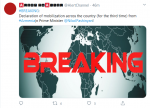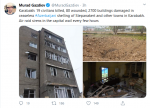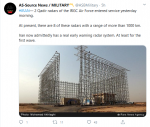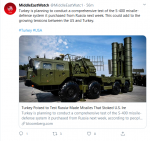Iran’s delicate balancing act in the Nagorno-Karabakh conflict
A picture taken on April 24, 2018 shows Iranians shopping for carpets at the Bazaar in Tabriz in Iran's northwestern East-Azerbaijan province [Atta Kenare/AFP]
5 Oct 2020
Tehran, Iran – With Armenia and Azerbaijan locked in a fresh conflict over the contested region of Nagorno-Karabakh, neighbouring Iran finds itself in a delicate balancing act, with political, historical and ethnic considerations.
Iran’s official stance, after having tried to resolve the long-running conflict in previous decades through diplomatic means, remains one of mediation, calling for an immediate ceasefire and dialogue.
Iran also recognises several United Nations resolutions that stipulate Nagorno-Karabakh, which is controlled by ethnic Armenians backed by Armenia, is part of Azerbaijan and that occupied Azeri lands must be returned.
The region broke away from Azerbaijan in a war during the late 1980s and early 1990s but is not recognised by any country as an independent country, including Armenia.
Iran, which shares borders with both Armenia and Azerbaijan, last week reassured Azerbaijan that it recognises its territorial integrity and that it holds an important place in Iranian foreign policy.
In this photo released by an official website of the office of the Iranian Presidency, Iran’s President Hassan Rouhani, right, shakes hands with Azerbaijan’s President Ilham Aliyev during their meeting at the Saadabad Palace in Tehran, Iran, Wednesday, Nov. 1, 2017 [Iranian Presidency Office via AP]Iranian President Hassan Rouhani also had a phone call with Armenian Prime Minister Nikol Pashynian to call for conflict resolution “through political discourse and international laws”.
However, there have been allegations that Iran supports Armenia, which in turn is supported by Russia. Recently, videos circulating on social media purportedly showed military equipment being transferred to Armenia via trucks passing through an Iranian border pass.
Iran quickly denied the allegations, saying they were “baseless rumours” aimed at smearing relations with Azerbaijan. Iranian state television broadcast footage from the Nordooz border terminal where the vehicles in question were.
They were shown to be Russian Kamaz trucks, which a local official said had been purchased by Armenia before the conflict and were being transported through Iran. The trucks were shown to be carrying vehicle parts.
In this photo released by an official website of the office of the Iranian Presidency, President Hassan Rouhani, left, and Armenian Prime Minister Nikol Pashinyan shake hands during a welcome ceremony at the Saadabad Palace in Tehran, Iran, Feb. 27, 2019 [Office of the Iranian Supreme Leader via AP]Meanwhile, several rockets and shelling from the Nagorno-Karabakh fighting have landed on Iranian soil, with several shells hitting a residential area close to the border for the first time, injuring a six-year-old, on Thursday.
Iranian foreign ministry spokesman Saeed Khatibzadeh reacted to the incident, saying the country “will not tolerate” the conflict spilling into its borders.
Geopolitical factors
The involvement of other countries in the Nagorno-Karabakh conflict, and their relations with Iran, makes the issue even more complicated.
Israel, for instance, has developed close ties with Azerbaijan and sells Baku military equipment.
Assistant to the president of Azerbaijan, Hikmet Hajiyev, said last week that Azeri forces have been using Israeli-made attack drones in the conflict. In response, Armenia recalled its ambassador from Israel.
Turkey, Baku’s strongest ally in the conflict, has thrown its unequivocal supported behind Azerbaijan.
French President Emmanuel Macron said on Friday that Turkey had sent Syrian fighters drawn from “jihadist groups” to fight for Azerbaijan in Nagorno-Karabakh and that it had “crossed a red line”. Turkey and Azerbaijan deny the allegations.
Considering the various and opposing vested interests in the region, Iranian politician Mohammad Javad Jamali believes resolving the conflict is now more difficult than it was before.
“We believe those who foment the killings, especially the US and Israel, would like the fires of conflict to remain aflame,” the former senior member of the Iranian parliament’s national security and foreign policy commission told Al Jazeera.
Iran’s Black Church, an ancient Armenian Christian place of worship, near Chaldoran 650 km (404 miles) northwest of Tehran close to the borders of Turkey and Armenia October 8, 2007 [Caren Firouz/Reuters]According to Jamali, members of the OSCE Minsk Group, especially the United States, have failed in their stated goal of ending the conflict.
The group, co-chaired by France, Russia and the US, was formed in 1992 to reach a peaceful, negotiated resolution to the Nagorno-Karabakh conflict.
Jamali believes the clash can only be resolved through peaceful means, specifically via a UN-led effort that would consider the intricate geopolitical, historical and ethnic factors involved.
“The only ones who will be hurt by this are the people of the region,” he said. “This conflict cannot go on forever in such a strategic area of the region”.
Mahmoud Ahmadi Bighash, a current member of the parliamentary national security and foreign policy commission, also believes the conflict cannot be resolved through anything but negotiations.
“The two countries must put an end to fighting through peaceful means and negotiations that do not include other countries, like the US and Israel, that don’t want the region to be peaceful,” he told Al Jazeera. “Fighting in the region will certainly be to the detriment of our country as well, and I believe we must work toward ending the conflict.”
‘Psychologically we are one nation’
Parts of modern-day Azerbaijan, Armenia and Turkey were once part of the Persian Empire, with communities spread on either side of the modern boundaries.
As a result, many of the ethnic Azeris who live across Iran, especially in the provinces of Ardabil and East Azerbaijan bordering Azerbaijan, feel a close kinship with people across the border.
“In terms of political divides and official borders we are two separate countries, but psychologically and religiously we are one nation,” says 42-year-old Soleiman, a resident of Tabriz, the capital of Iran’s East Azerbaijan Province.
“It’s like there’s a fight going on in your brother’s house, you would look at their problem as your problem,” he told Al Jazeera, requesting his last name be withheld to protect his privacy.
Soleiman, who was a child when Nagorno-Karabakh broke away from Azerbaijan in a bloody conflict, agrees with the UN resolutions calling for the freeing of Azeri lands, saying that Armenian troops should withdraw immediately.
“No war anywhere in the world has ever been good for anyone, and I sincerely hope this conflict would be resolved without military fighting as soon as possible.”
Several Iranian cities are also home to Armenian communities who feel just as strongly about the long-running conflict.
“It’s not the first time that the people of Artsakh have been disturbed by Azerbaijan, the first one being in 1992, right after Artsakh was declared an independent territory,” said Tehran resident Armond Ghazarian, using the Armenian name for the contested territory.
Twenty-six-year-old Ghazarian moved to Iran with his Armenian-born wife in 1993.
He said centuries ago, the area now known as Nagorno-Karabakh was called Kachen after the Armenian family who ruled the territory.
“It breaks my heart because I know the Armenians of Artsakh want to live in peace, and Azerbaijan is the puppet that the government of Turkey is using with the intention of eventually finishing the Armenian Genocide,” Ghazarian said.
Armenia says approximately 1.5 million Armenians had been systematically murdered during and shortly after World War I by the Ottoman government, an account that is officially recognised by more than 32 governments, including the US, Russia, and Germany. Turkey vehemently denies accusations of genocide, saying a few hundred thousand Armenians had died as part of the war.
Demonstrations in Iran
In the past week, several videos were published on social media showing small demonstrations in at least four cities, including Tehran and Tabriz, in support of Azerbaijan.
“Karabakh belongs to us and will continue to belong to us,” protesters can be heard chanting in one video.
Last week, imams of Friday prayers in four predominantly Azeri provinces, namely West Azerbaijan, East Azerbaijan, Ardebil and Zanjan, issued a joint statement in support of Baku.
Azerbaijan is acting in “full compliance” with the law, Islamic law and four UN Security Council resolutions, they said.
Former MP Jamali said imams hold a “non-diplomatic and non-administrative” place. They usually try to reflect the views of their people and are free to express their opinions, he said.
“But certainly, the stance of the Islamic Republic is the one announced by the officials,” he told Al Jazeera.
“Indeed we respect both our neighbouring countries, especially as we have both Azeri Turkic and Armenian people in our country,” Jamali said, “and our political efforts have always been aimed at improving relations with our neighbours.”
posted for fair use
Iran shares borders with Armenia and Azerbaijan, and is home to communities with origins in both countries.

www.aljazeera.com




![A picture taken on April 24, 2018 shows Iranians shopping for carpets at the Bazaar in Tabriz in Iran's northwestern East-Azerbaijan province [Atta Kenare/AFP] A picture taken on April 24, 2018 shows Iranians shopping for carpets at the Bazaar in Tabriz in Iran's northwestern East-Azerbaijan province [Atta Kenare/AFP]](https://www.aljazeera.com/wp-content/uploads/2020/10/000_14A5XR.jpg?resize=770%2C513)
















